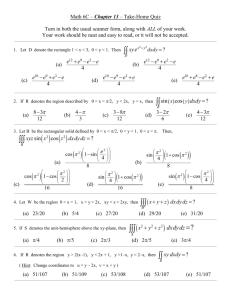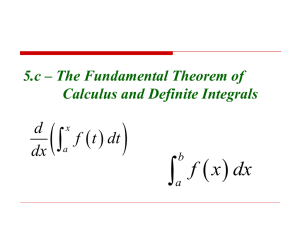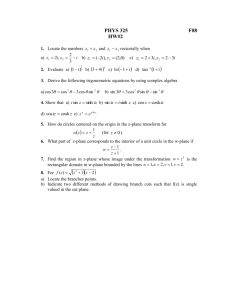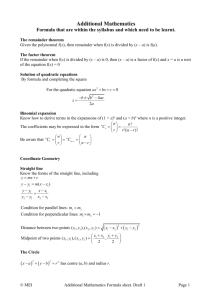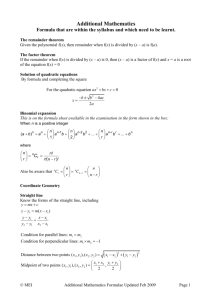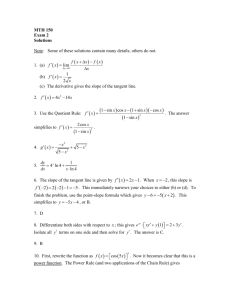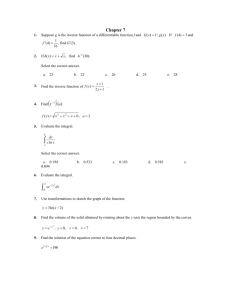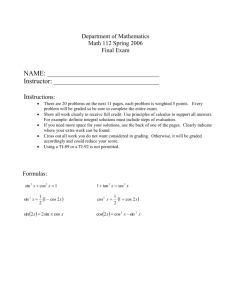Example
advertisement
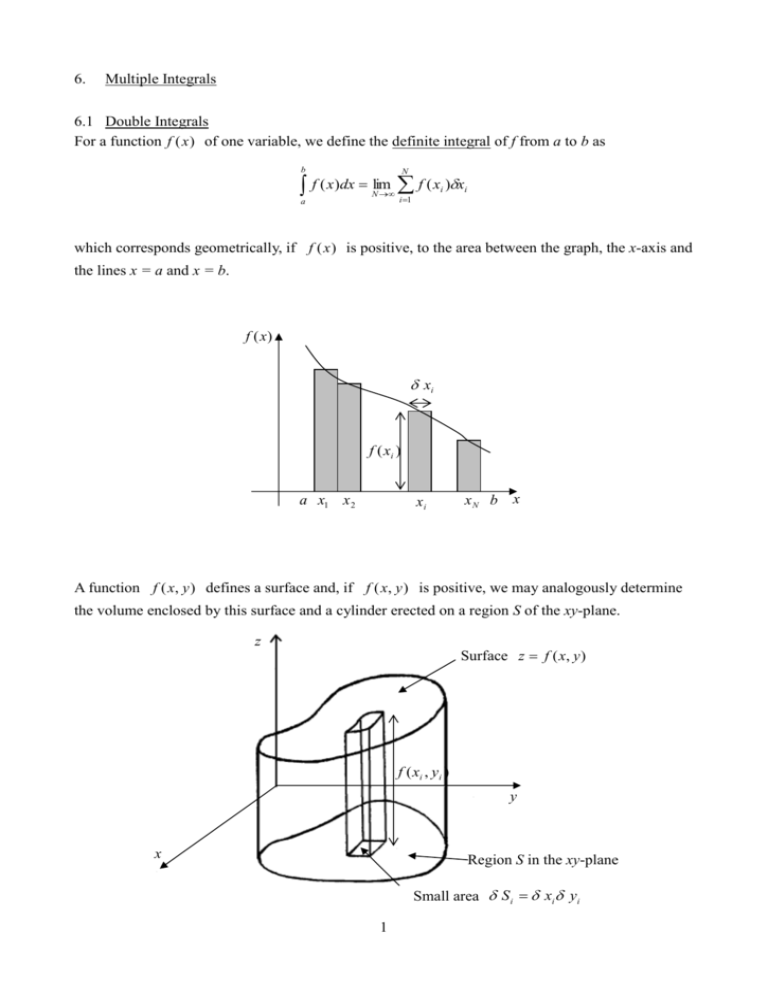
6. Multiple Integrals 6.1 Double Integrals For a function f ( x ) of one variable, we define the definite integral of f from a to b as b f ( x )dx lim a N N f ( x )x i i 1 i which corresponds geometrically, if f ( x ) is positive, to the area between the graph, the x-axis and the lines x = a and x = b. f (x ) xi f ( xi ) a x1 x 2 xi xN b x A function f ( x, y ) defines a surface and, if f ( x, y ) is positive, we may analogously determine the volume enclosed by this surface and a cylinder erected on a region S of the xy-plane. z Surface z f ( x, y ) f ( xi , y i ) y x Region S in the xy-plane Small area S i xi yi 1 Divide S into N small area elements such that the ith element has area S i xi yi and contains the point ( xi , yi ) . Then f ( xi , yi ) S i is the volume of the column with base S i and height f ( xi , yi ) and we define the double integral of f ( x, y ) over the region S to be S f x, y dS S f x, y dxdy lim N N f x , y S i i 1 i i This definition is taken when f ( x, y ) is any two-dimensional scalar field. Such an integral is sometimes called a surface integral or a repeated integral (as its evaluation often involves two definite integrals). The evaluation of such integrals is best illustrated through examples. Example dxdy = area of the region S if f ( x, y) 1 . S Example (Rectangular regions) If S is the region a x b, c y d f x, y dxdy f x, y dx dy b d f x, y dy dx xa y c S d b y c xa (1) y 1 2 (2) y d d y y c c x a x a b x x b x Example Evaluate (2 xy y 2 )dxdy where S is the rectangle 1 x 2, 0 y 1 . S Sol: 2 1 1 2 2 2 2 2 4 y 2 y 2 y y 2 dy 2 xy y dx dy x y xy dy 0 1 1 0 0 3 y 2 y 3 1 11 3 0 6 2 1 or 2 2 1 2 y3 1 x 2 x 2 4 2 1 1 11 1 2 2 xy y dy dx xy dx x dx 0 1 0 3 3 2 31 2 3 2 3 6 1 1 2 Example (Non-rectangular regions) y h(x) y y h(x) d S h( y ) c g (x) a g (x) x x b a x b, g ( x ) y h ( x ) c y d , h( y ) x g ( y ) b h( x) xa y g ( x) S g ( y) S f ( x, y ) dy dx g ( y ) f ( x, y )dx dy y c x h ( y ) d a b a x b, g ( x ) y h ( x ) b h( x) xa y g ( x) f ( x, y ) dy dx Variable Limits unless a rectangular region Constant Limits Example Evaluate xy dxdy where S is the region bounded by 2 y 0, y x 2 and x 1 . S Sol: y A sketch of the region S is important, but it is not necessary to be able to visualize the surface f ( x, y ) . 1 0 y x2 S y0 x 1 x 1 3 x 1 1 x 2 y3 x2 x7 S xy dxdy 0 0 xy dy dx 0 x 3 0 dx 0 3 dx 2 1 2 x8 1 1 24 0 24 or 1 1 1 2 2 x2 1 y2 y3 S xy dxdy 0 xy dx dy 0 y 2 y dx 0 2 2 dx y 3 4 y y 1 1 8 0 24 6 1 2 In some cases, one order of integration may be easier than the other, e.g. 1 2 y y 0 x y 1 fdxdy x2 x 0 y 0 fdydx 2 2 x x 1 y 0 fdydx y 1 y x2 y -x+2 S 0 1 y0 x 2 Example Let 1 y2 1 f ( x , y ) 2 x 0 if 0 x y 1 if 0 y x 1 otherwise if 0 x, y 1 Show that the double integral f ( x, y)dxdy , where Q [0,1] [0,1] can not exist by pointing Q 1 1 1 1 out f ( x, y )dy dx f ( x, y )dx dy . 0 0 0 0 Proof: 4 1 x 1 1 0 0 f ( x, y)dy dx 0 0 f ( x, y)dy x f ( x, y)dy dx 1 1 1 x 1 1 2 dy 2 dy dx 1dx 1 0 0 x x y 0 1 1 y 1 1 f ( x , y ) dx dy f ( x , y ) dx f ( x , y ) dx dy 0 0 0 0 y 1 1 1 y 1 1 2 dx 2 dx dy 1dx 1 0 y 0 y x 0 1 Hence, 1 1 1 0 0 f ( x, y)dy dx 0 0 f ( x, y)dxdy 1 As the two iterated integrals exist but are unequal, the double integral f ( x, y)dxdy , where Q Q [0,1] [0,1] can not exist. Example x 0 x f ( x, y)dy dx . 1 Change the order of the integration in Sol: The line y x and the parabola y x cut at (0,0) & (1,1). The domain of integration is the area bounded by y x and y x (the same as x y 2 ). 1y x f ( x , y ) dy dx f ( x , y ) dx dy 0 x 2 0 y 1 So 6.2 Change of Variable in Double Integrals For the definite integral I f x dx b a We know that the change of variable x = x(u) produces dx I f xu du du where x( ) a, x( ) b 5 For the double integral I f x, y dxdy S The change of variable x = x(u,v), y = y(u,v) gives I f xu , v , y u , v S* x, y dudv u , v where x x, y J det u u, v y u x v y v is called the Jacobian of the transformation. S * is the region in the uv-plane corresponding to the region S in the xy-plane. Also J must be of one sign in S * . Example Find the moment of inertia of a hollow circular cylinder of inner radius a, outer radius b, height h and constant density about the axis of the cylinder. Sol: y a b x S Change to polar coordinates x r cos x x, y r J r , y r MI h x 2 y 2 dS y r sin x cos y sin i.e. dxdy rdrd This corresponds to an element of area in the r - plane. 6 r sin r r cos The region of integration is now a rectangle in the r - plane, 0 2 , a r b MI b 2 r a 0 h 2 hr 2 rdrd h 2 r 4 b 0 4 a b4 a 4 M 2 a b 2 where mass M h b 2 a 2 4 2 Example yx y x e dxdy , where Q is bounded by x y 2, x 0, y 0 . Evaluate the integral Q Sol: The presence of y x & y x in the integral suggests the change of variables vu vu ,y . 2 2 Under the transformations u y x & v y x , the lines x y 2, x 0, y 0 map onto the u y x & v y x . Solving for x and y we find x lines v 2, u v 0, u v 0 , respectively. Points inside Q are carried into points inside the triangular region T bounded by v 2, u v 0, u v 0 . 1 ( x, y ) The J det 2 (u, v) 1 2 1 1 1 2 1 or J ( x, y ) 1 1 (u , v) (u , v) 2 1 1 2 det 2 ( x, y ) 1 1 Therefore e Q yx y x 2 v u 2 1 1 v 1 1 1 dxdy e dudv e du dv v e dv e 2 2 0 v 20 e e T u v Example Evaluate R 1 x 2 y p 2 2 dxdy over the region R: x 2 y 2 1 . 7 Sol: 1 Consider x Rk y 2 p 2 2 dxdy where Rk : 1 x 2 y 2 k 2 . Then R 1 x 2 y p 2 2 dxdy lim k Rk 1 x 2 y p 2 2 dxdy if the limit exists. Let x r cos , y r sin , where 1 r k ,0 2 . x ( x, y ) det r The J ( r , ) x y r det cos r sin y sin r r cos Then k 2 r 1 p R 2 2 p dxdy 1 0 r p d dr 1 2r dr k x y 2 k 1 r 2 p 2 2 p 2 k 2 p 1 2 p k 1 Therefore, R 1 x 2 y p 2 2 So, if p 2 , k R If p 2 , R dxdy lim x x 1 x 2 y 1 2 Rk 1 y p 2 2 p 2 2 2 y p 2 2 dxdy dxdy lim k 2 2 1 k 2 p 1 lim p 2 1 k 2 p 2 p k 2 p2 . dxdy diverges, that means R 1 x 2 y p 2 2 Example Evaluate R log x 2 y 2 x 2 y 1 2 2 dxdy over the region R: x 2 y 2 1 . Sol: 8 dxdy does not exist. We observe that the function f ( x, y ) log x 2 y 2 x 2 y 1 2 2 is not defined at the point (0,0). log x 2 y 2 dxdy over the region R : 0 2 x 2 y 2 1 . Consider 1 R x 2 y 2 2 Then R log x 2 y 2 x 2 y 1 2 2 dxdy lim 0 R log x 2 y 2 x y 2 1 2 2 dxdy Let x r cos , y r sin , where r 1,0 2 . We have R log x 2 y 2 x 2 y2 1 2 dxdy 1 2 log r 2 2 0 r rd dr 2 log( r )dr 1 1 1 1 2 r log( r 2 ) 1 rd log( r 2 ) 2 log( 2 ) r 2 2rdr r 2 2 2 log( ) (2 2 ) 2 2 log( ) 2 As a result, log x 2 y 2 log x 2 y 2 dxdy lim dxdy lim 2 2 log( 2 ) 2 4 1 R 2 2 1 0 0 R x 2 y 2 2 x y 2 Remark: The above two examples are the so called improper integrals. Example Evaluate e x2 dx . 0 Sol: Suppose x x e dx really exists and let I e dx . 2 2 0 y 0 2 2 Then I 2 e x dx e y dy . 0 0 Since I e x dx is a number (a constant) and 2 0 x e 0 9 y2 x dy is a definite integral. We learnt the rule b b a a that k f ( x)dx kf ( x)dx where k is a constant. x 2 y 2 x 2 y 2 Therefore we have I e dx e dy e dx e dy 0 0 00 2 2 2 2 2 Also e x dx e y e y e x dx as both 0 0 x y e dx & e 2 2 are numbers. 0 x 2 y 2 x 2 y 2 x2 y2 Thus, I e dx e dy e dx e dy e e dx dy . 0 0 0 00 0 2 b b a a Using the rule k f ( x)dx kf ( x)dx again, we have 2 2 2 2 2 2 2 2 I 2 e x dx e y dy e x dx e y dy e y e x dx dy e y e x dx dy 0 00 0 0 00 0 2 2 e ( x y ) dx dy 00 ( x 2 y 2 ) dx dy is equivalent 0 0 e to integrating the function f ( x, y) e ( x 2 y2 ) over the region R of the first quadrant of xy- plane. From the transformations x r cos , y r sin ,which are from r -plane to xy-plane, we have the inverse transformations r x 2 y 2 , tan 1 And the transformations y , which are from r -plane to xy-plane. x r x 2 y 2 , tan 1 y x map the quarter circle x 2 y 2 r02 , x, y 0 to r r0 , therefore map the region R of the first quadrant of xy- plane onto the region R bounded by r 0, 0, 2 So 10 . 2 ( x, y ) 2 ( x 2 y 2 ) r 2 r I e dx dy e rd dr where J ( r , ) 00 00 And 2 r 2 r 2 r 2 2 e r d dr e r dr e d (r 2 ) e r 0 0 2 40 4 0 1 1 4 4 1 (Remark: e 2 lim a 1 ea 2 0 1 2 1 4 e ) Finally, we have x 2 y 2 2 I e dx e dy e x dx 4 2 0 0 0 4 2 Example Evaluate the double integral y x 2 dxdy where Q [1,1] [0,2] . Q Sol: x 2 y for 1 x 1,0 y x 2 f ( x, y ) 2 2 y x for 1 x 1, x y 1 2 y x dxdy 1 0 1 2 Q 1 x 2 2 y x dy dx x y dy y x 2 dy dx 0 1 x2 2 2 2 x x 2 y dy y x 2 dy dx 1 x2 0 1 2 For the first integral we make the change of t y x 2 . This gives us variable t x 2 y and in the second we put 11 2 1 0 2 x x 2 2 y x dxdy x y dy y x dy dx t dt t dt Q 0 2 0 dx 1 1 x2 x 3 1 1 3 2 3 2 2 2 2 t 2 0x 2 t 2 02 x dx x 3 2 x 2 2 dx 3 3 3 3 1 1 2 1 2 2 1 3 4 2 x 2 2 dx 30 From the integration table we have 1 3 4 1 2 2 2 x dx x 2 x 2 30 3 x 1 3x 2 x 2 6 arcsin 2 0 3 2 4 3 2 Or let x 2 sin then dx 2 cosd . When x 0, 0; x 1, 4 So 1 3 4 44 2 2 2 x dx 2 2 sin 2 30 30 4 16 cos 2 3 0 3 2 3 2 2 cos d 2 16 16 16 4 cos 2 1 cos d cos 4 d cos 2 d d 3 0 3 0 3 0 2 4 44 3 2 cos d 2 2 cos 2 30 3 2 4 2 4 4 4 cos 4 1 2 cos 2 2 cos 2 1 d 2 cos 2 1d 30 3 0 2 4 4 4 2 cos 4 8 1 cos 2 2 d sin 4 sin 2 2 04 3 3 3 3 2 6 0 4 6.3 Triple Integrals Suppose that a scalar field f ( x, y , z ) is defined at all points xi , yi , zi within a region V of three-dimensional space. Divide V into N subregious such that the ith subregion has volume Vi and contains a point ( xi , yi , z i ) . We define the triple integral of f ( x, y , z ) over the region V to be V f x, y, z dV V N f x, y, z dxdydz lim f xi , y i , z i VL N Such an integral is often called a volume integral. 12 i 1 Examples (i) If f ( x, y, z ) 1 , then V dxdydz = volume of the region V. (ii) If f ( x, y, z ) , the scalar field giving the density at a point, then V dxdydz = mass of the region V. (iii) If f ( x, y, z ) d 2 where d is the perpendicular distance of a point in the region V to a fixed axis, then V d 2 dxdydz = moment of inertia of the region V about the given axis. (iv) If f ( x, y, z ) is the charge density at a point, then V dxdydz = total charge within the region V. Example (Rectangular regions) The density of a rectangular blocks bounded by the planes x = 1, x = 2, y = 0, y = 3, z = -1 and z = 0 is given by the scalar function ( x, y.z ) x( y 1) z . Find the mass of the block. z 3 0 y 1 2 -1 x x( y 1) z dzdydx x 1 y 0 z 1 x( y 1) z dz dy dx x 1 y 0 z 1 Mass 2 3 0 2 3 0 2 3 2 3 z2 0 1 x ( y 1) z dy dx x ( y 1 dy dx x 1 y 0 x 1 y 0 2 1 2 2 2 xy 2 9x 1 3 3 3 2 51 15 xy y dx 3x dx x 2 x x 1 x 1 2 0 2 2 1 4 2 4 2 13 Example (Non-rectangular regions) z z 2 ( x, y ) z 1 ( x, y ) y x a1 x a2 y 1 ( x) y 2 ( x) x Suppose V is bounded above by the surface z 2 ( x, y) and below by z 1 ( x, y) , and its projection onto the xy-plane is described by a1 x a2 , 1 ( x) y 2 ( x) . Then, f ( x, y, z )dxdydz V CONSTANT 2 ( x ) 2 ( x , y ) f ( x , y , z ) dz dy dx 1 ( x , y ) x a1 y 1 ( x ) a2 FUNCTIONS OF x IN GENERAL FUNCTIONS OF x AND y IN GENERAL Similarly, it may be more convenient to project V onto the xz- or yz-planes. Example Evaluate V 1 dxdydz where V is the region enclosed by the planes x = 0, ( x y 2 z 1) 3 y = 0, z = 0 and x + y + z = 1. 14 z y z 1 1 x z 1 z 1 x y o 1 y y 1 x 1 x Sol: The projection of V on xy-plane is xy which is bounded by x 0, y 0, y 1 x . 1 1 x 1 x y 1 x y 1 1 dz dxdy dz dy dx 3 3 ( x y 2 z 1) 0 0 ( x y 2 z 1) xy 0 0 1 1 x 1 x 1 x y 1 1 1 dy dx dy dx 2 2 2 0 4( x y 2 z 1) 4( x y 1) 4( 3 x y ) 0 0 0 0 1 1 1 x 1 1 1 1 1 1 dx dx 4( x y 1) 4(3 x y ) 0 8 8 4( x 1) 4(3 x ) 0 0 1 1 x 1 1 1 log x 1 log 3 x log 3 1 4 4 4 0 4 Example Evaluate 2 xyzdxdydz where V is the region bounded by the parabolic cylinder z 2 V and the planes x = 0, y = x and y 0 . 15 1 2 x 2 z y=x y0 z 2 1 2 x 2 2 The region V y 2 x z=0 Sol: Projecting V onto the xz-plane gives xz which is bounded z 2 x 0 xz 2 xyzdy dxdz xz 1 2 x , x 0, z 0 2 2 12 x 2 2 x xy 2 z dxdz x 3 zdxdz x 3 zdz dx 0 0 xz 0 2 3 1 2 x 2 x 1 2 3 2 2x z 2 2 4 2 x dx dx 2 0 0 2 3 2 0 Alternatively, projecting V onto the xy-plane gives xy which is bounded 2 42 z z 0 x 0 x y 0 2 xyzdydxdz 4 3 Example Evaluate xyzdxdydz , where V is the region enclosed by V x 2 y 2 z 2 1, where x 0, z 0, y 0 & x 0, y 0, z 0 16 Sol: The projection of x 2 y 2 1, where x 0, V onto xy-plane is xy which is bounded by y 0 & x 0, y 0 So xyzdxdydz V xy 1 dxdy xyzdz 0 0 1 x 2 y 2 1 x 2 0 dy dx xyzdz 0 1 x 2 y 2 Then 1 x 2 1 x 2 y 2 1 1 x 2 z 2 1 x 2 y 2 xyzdxdydz xyzdz dy dx xy dy dx 0 2 V 0 0 0 0 0 1 1 x 2 1 1 x 2 1 x2 y2 xy x 3 y xy3 dy dx dy dx xy 2 2 0 0 0 0 1 1 ( x x 3 ) y 2 xy 4 1 x 2 (x x3 ) 1 x 2 x 1 x2 dx dx 4 8 0 4 8 0 0 1 1 1 x x x 2 4 0 3 x 1 x2 2 dx 1 x x x 1 0 2 4 3 2 2 1 x 2x3 x5 dx dx 0 8 x2 x4 x6 1 1 0 48 16 16 48 Example Find the (a) volume V and (b) centroid ( x , y , z ) of the region R bounded by the parabolic cylinder z 4 x 2 and the planes x 0, y 0, y 6, z 0 assuming the density to be a constant 0 Sol: (a) 2 6 2 6 4 x 2 2 V 1dxdydz 1dz dy dx 4 x dy dx 4 x 2 y 60 dx R 0 0 0 0 0 0 2 2 24 6 x 2 dx 32 0 (b) Total mass m dxdydz 32 R The centroid ( x, y, z ) of the region R: 17 6 4 x 2 xdxdydz xdzdy dx 0 Total moment about yz plane 0 0 x R Total mass 32 32 2 6 2 2 x 4 x 2 dy dx 6 x 4 x 2 xdx 6 x 4 x 2 xdx 24 3 0 0 0 0 32 32 32 32 4 2 Total moment about xz plane y Total mass z Total moment about xy plane Total mass ydxdydz R 32 zdxdydz R 32 96 3 32 256 8 5 32 5 3 8 Thus the centroid ( x, y, z ) of the region R: has coordinates ,3, . 4 5 6.4 Change of Variable in Triple Integrals If I f ( x, y , z )dxdydz , the change of variable x x(u, v, w), y (u, v, w), z z (u, v, w) , gives V I F (u, v, w) V x, y , z dudvdw , where u, v, w x u ( x, y , z ) y J (u, v, w) u z u x v y v z v x w y w z w is the Jacobian of the transformation. V is the region in uvw-space corresponding to the region V in xyz-space. J must be of one sign in V . The most popular alternative coordinate systems to Cartesian coordinates are cylindrical polar coordinates and spherical polar coordinates. 18 Cylindrical Polar Coordinates z r , , z x r cos y r sin z zz y r r 0, 0 2 , z x r constant – cylinder constant – plane constant – plane z cos x, y , z J sin r , , z 0 r sin r cos 0 0 0 r 1 dV dxdydz rdrddz This corresponds to an element of volume in cylindrical polar coordinates. z z r r z y r x V rrz 19 Example Find the volume between the surfaces x 2 y 2 2, z x 2 y 2 2 and the z = 0 plane. z z x 2 y 2 2 parabolic bowl x 2 y 2 2 cylinder y x Sol: 2 x 2 x 2 y 2 2 In Cartesian coordinates we have 1dz dy dx while in cylindrical polar coordinates: 2 2 x 2 0 2 Volume 2 r 0 rdzddr r 2 r2 2 2 0 z 0 r 0 2 0 3 2r dd r 6 Example Using cylindrical polar coordinates, evaluate x 2 y 2 dxdydz , where V is the solid enclosed V by x 2 y 2 2 z, z 2 Sol: The projection of V onto xy-plane is xy which is bounded by x 2 y 2 4 . So 2 2 2 2 r2 x 2 y 2 dxdydz r 2 rdz d dr r 3 2 2 0 0 0 0 r2 2 V 2 r2 2r 3 2 2 0 2 d dr r 6 2 64 32 16 dr r 4 0 16 6 6 6 3 20 Spherical Polar Coordinates x r sin cos y r sin sin z r cos z r , , r 0, r 0 , 0 2 y x r constant - sphere – cone constant - plane constant sin cos x, y , z J sin sin r , , cos 2 r sin r cos cos r cos sin r sin r sin sin r sin cos 0 dV dxdydz r 2 sin drdd This corresponds to an element of volume in spherical polar coordinates. z r r sin r x V r 2 sin r r y Example In a sample model of the charge distribution around the positively charged (Q) nucleus of the hydrogen atom the charge density in the electron cloud at a distance r from the atom is 21 Q a (r) e where a is the Bohr radius. Determine the total charge in the electron cloud. a3 Sol: 2r 2r 2 Q 2 r 2 Q a 2 a q 3 e r sin d d dr 2 3 e r sin d dr a 0 0 a 0 0 0 2r 2r 2 r Q 4Q 4Q a 2 3 e a r 2 cos 0 dr 3 e a r 2 dr 3 r 2 d e a a a 0 a 2 0 0 2r 2Q 2 a r e a2 0 e 2r a 0 d r 2 Note: Differentiate with respect to b twice the top and the bottom of b2 2b ea r 2e 2r a 0 lim b2 b e 2b a lim b 2b 2 e a lim 2b a b 2 2b 4 a e a2 0 Therefore, 2Q 2 a r e a2 2r q 0 e 2r a 0 2r 2r 2r 2Q 2Q 4Q a d r 2 2 e a d r 2 2 2re a dr 2 rd e a a 0 a 0 a 0 2 2ar 2Q 2ar 2Q e r d re a 0 a 2Q a 1 a 2 2ar e 0 0 e 0 2r a 2r 2r 2Q a 2Q a a dr e dr e a 0 a 2 0 2Q 0 a Q a 2 Note The vector operators , and may be expressed in terms of other coordinates. For example, in spherical polar coordinates, 1 1 ir i i r r r sin And 2 1 2 1 1 2 r sin r 2 sin 2 2 r 2 r r r r sin 22
